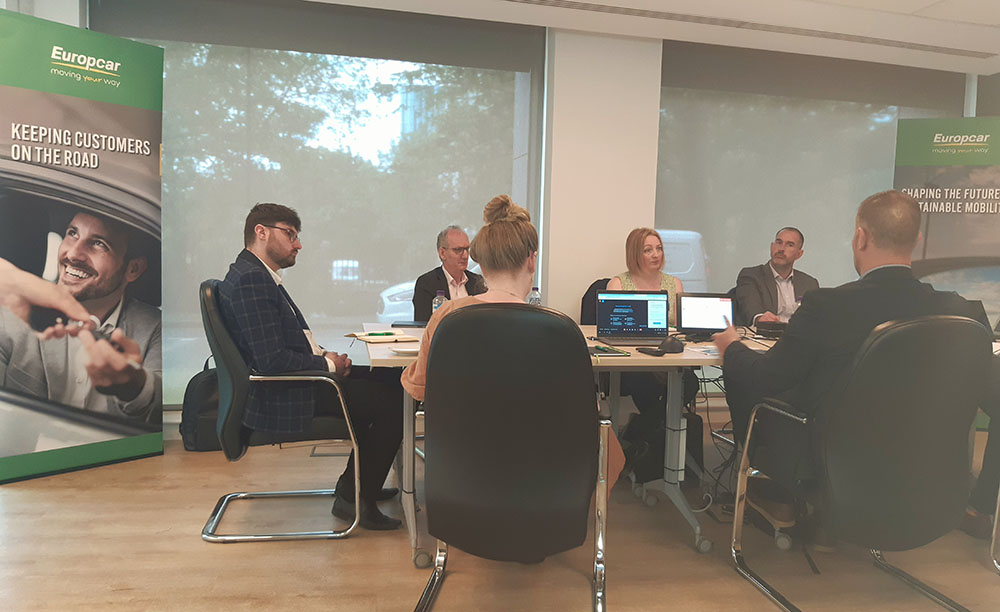Modern Insurance Magazine Roundtable

Europcar Mobility Group UK and Modern Insurance Magazine recently hosted the second in a series of roundtable events to discuss the customer benefits of collaboration between credit hire organisations, vehicle rental companies and insurers. Europcar’s Business Development Director, Insurance, James Roberts sat down with a group of experts from across the insurance, credit hire and repairer sectors:
Matt Corby, Managing Director, Rive~It
Jamie Summerscales, Senior Manager, Third Party Claims, Covéa Insurance
Wayne Mason-Drust, Managing Director, Accident Express Group
Kirsty McKno, Managing Director, Cogent Hire
Luke LeSauteur, Director, West Grove Consulting

Not to shy away from the big issues, the group kicked off by discussing what Kirsty McKno admitted is a controversial opinion: the current credit hire processes in the industry are broken. She called for open and honest discussion to identify exactly where the breaks are and where genuine friction exists. Kirsty believes successful collaboration requires a true meeting of minds, two sides coming together with the same agenda, and the industry is currently not transparent enough and does not share enough data.
Wayne Mason-Drust added that where credit hire is today is not really where it was originally intended to be. He believes it is important to recognise this to get the industry to where it needs to be. He cited the example of the third-party system. Over the years this has been hardened and eroded so that it no longer does what it was designed to deliver. Kirsty agreed, stating that if it worked as intended, litigation would only be required for the all or nothing liability cases.
A like-minded vision
James Roberts asked how the industry can improve interactions and better support insurers. Jamie Summerscales spoke about how the General Terms of Agreement (GTA) was introduced to bring peace between insurers and credit hire organisations, but that time has seen a shift in behaviours. He believes it still works when both parties understand and buy into the same framework, but not when players start to move the goal posts or introduce new ambiguities. Then it begins to unravel, ultimately inviting litigation.
He believes that, before the industry can work together to fix what is not working today, participants in the GTA must look in the mirror and judge whether they contribute to the vision and purpose of the framework.
Matt Corby added that he believes communication is the missing ingredient to make collaboration successful. With opposing ways of structuring how credit hire is provided, and without common ground, there will always be friction. He said protocols work for larger players, but smaller MGAs and insurers must do their own thing and there is a void between the two where collaboration is impossible. Jamie agreed, pointing out that this breeds a damaging lack of trust.
One of the main challenges, according to Luke LeSauteur, is that everyone is seeking to gain competitive advantage. Large CHOs dominate the top 20 insurers and do the most transactions. It’s not in their interests, therefore, to collaborate. Until priorities change from profit to purpose, these conversations will be very difficult. Everyone around the table agreed that better competition is needed, to breed better practice and keep CHOs more honest.

Credit or Courtesy?
The other major discussion point of the day was the significant issue about consumer misunderstanding of the terms around the vehicle supplied under a credit hire agreement while theirs is being repaired. In Jamie’s experience, many people do not realise they are driving a credit hire vehicle or that they will be liable for the cost later. Wayne agreed, citing examples of cases being referred onto a credit hire or credit repair business. He has had to explain to the customer what their rights are, and that the credit hire company will pay out a significant amount of money on their behalf, but they are ultimately responsible for the cost. Often these customers will opt to go through their own insurance instead.
Matt added that the next step in a non-fault claim, when the customer does opt to go through their own insurer, is that the insurer will refer them onto a credit hire company. In these cases, the customer is likely to accept the referral because they see this as part of their insurer’s service. However, this leaves the customer in the same situation and at risk of a large and unexpected cost if the terms are not clearly explained.
Using the term ‘credit’ is, in Kirsty’s opinion, a reason for customer confusion. The reality is the arrangement is just a deferment of payment rather than actual credit. She suggested that, perhaps, changing this terminology would help consumers understand the agreement they are entering.
Collaboration: Not just a buzzword
In the closing comments, Kirsty stated that ‘collaboration’ should not just be the latest trendy buzzword; players must commit wholeheartedly. Wayne reiterated the importance of every area of the industry being involved and heard in discussions, to shape the future and the terminology being used.
Jamie believes that there are a lot of challenges in the market that can be overcome together. He asked whether technology really can fix the problem, or does it bring just new ambiguity and make some things worse? Matt added that there is a lot of will from each organisation, but old legacy systems and mindsets are slowing down innovation and development. Luke suggested the involvement of bigger players in the discussions would help the industry and its customers.
The next session will take place in October, to continue the discussion.


